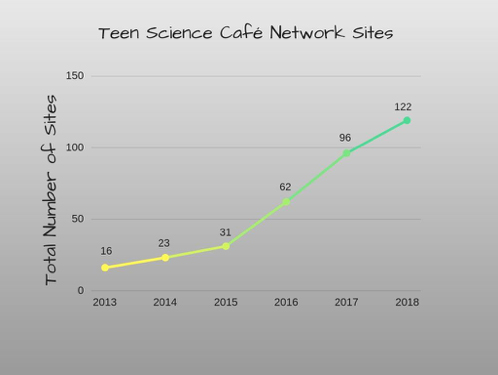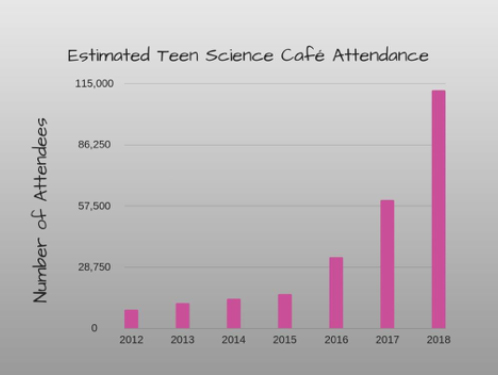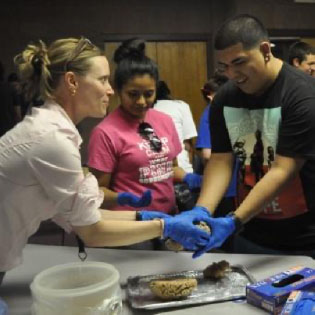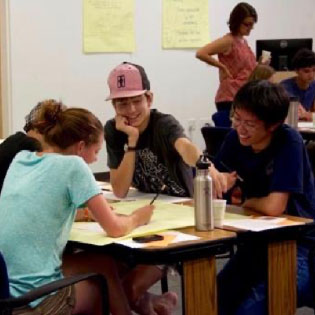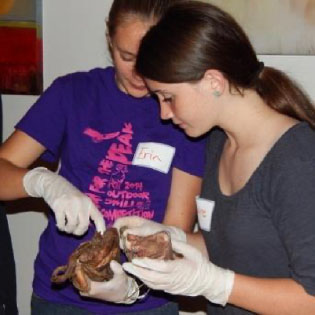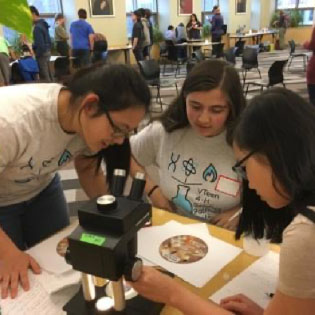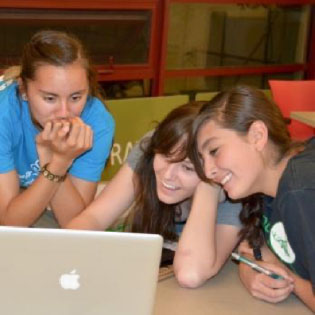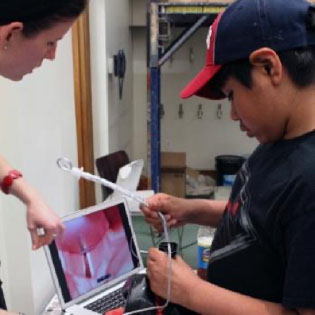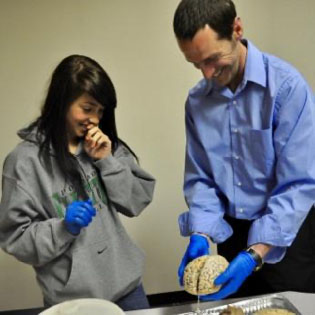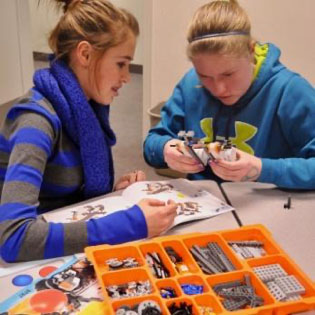Feature
Connecting Learning to Life
The Teen Science Café Network
Connected Science Learning October-December 2019 (Volume 1, Issue 12)
By Michelle Hall, and Michael Mayhew
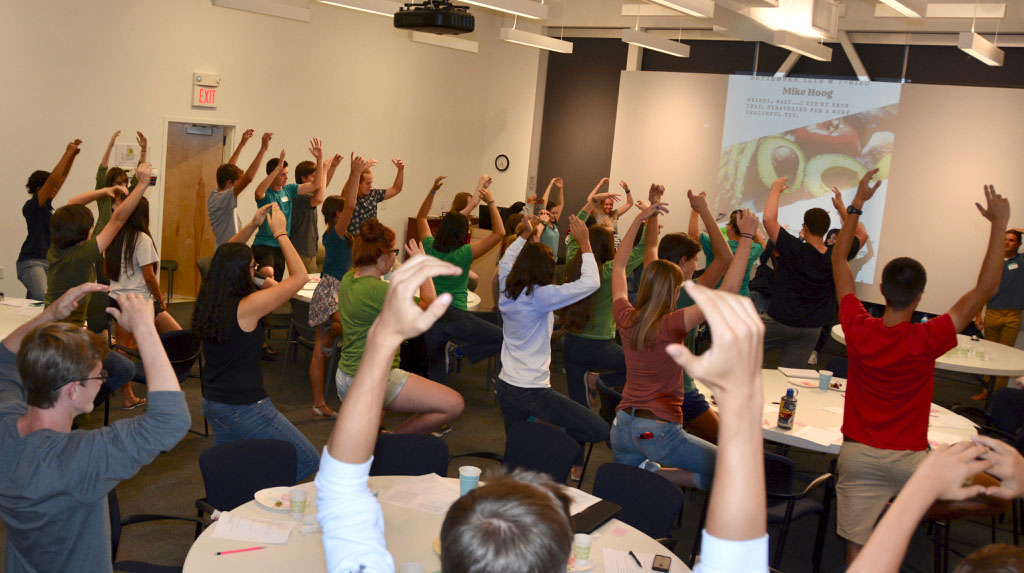
Teen science café programs are a free, fun way for high school teens to explore advances in science, technology, engineering, and mathematics (STEM). Through lively conversations and hands-on activities with STEM professionals, teen science café programs open doors for teens to learn from experts about exciting and rewarding career pathways.
The Teen Science Café Network (TSCN) is a free community of practice providing the highest quality resources and support to organizations that implement a teen science café. Our members are committed to help one another and continually improve teen science café experiences and their impacts by sharing their successes and lessons learned. We have made it a priority to recruit organizations as members in communities of color and rural areas, which comprise over 40% of our programs. We partner with libraries, 4-H, Boys and Girls Clubs and Scouts, 21st Century Academies, Upward Bound, Tribal leaders, as well as to some of the nation’s most prominent museums, science centers, aquaria, zoos, and universities across the United States. We seek organizations or individuals interested in offering STEM programming out-of-school. We continue to build partnerships with organizations large and small to provide access to teen science cafés.
Taking ownership of their work
Teen science café programs achieve teen ownership via teen leadership teams, led by a dedicated adult leader who is trained to foster a sense of ownership and proactivity in the teen leaders, so that they take on responsibility for the operation of their program and in the process develop lasting leadership skills. The role of the adult leader in mentoring teen leaders is critical. When teen leaders become proactive, they will develop the freedom to take charge and improve and perfect their program. Our evaluation revealed that teens who lead these programs engage in productive activities that develop strengths of character, compassion, courage, imagination, curiosity, initiative, self-reflection, communication, and problem-solving.
School partnerships
School partnerships are key to success of a teen science café program. The stating point for a typical program is to go into the schools and pitch the idea of the café program to the science teachers and science chairs, perhaps during an early morning meeting with them in their lounge. Usually one or more teachers would be willing to allow the café organizer to come into the science class and pitch the program to the students. The organizer can hand out a sign-up sheet for students to express interest in the program and leadership team and provide contact information. The organizer can use the contact information to announce a first café and also invite teens interested in being on a leadership team to a first meeting. This kind of pitch virtually always engages a first group of teens. Then word of the café program spreads virally.
We have found that teachers are universally supportive of the out-of-school program because the teen café is very different from the classroom, yet the experiences are complementary. Teachers have proven quite willing to promote the café program in school. Café organizers typically stay connected with their in-school contacts and regard them as important collaborators in connecting teens with science and scientists.
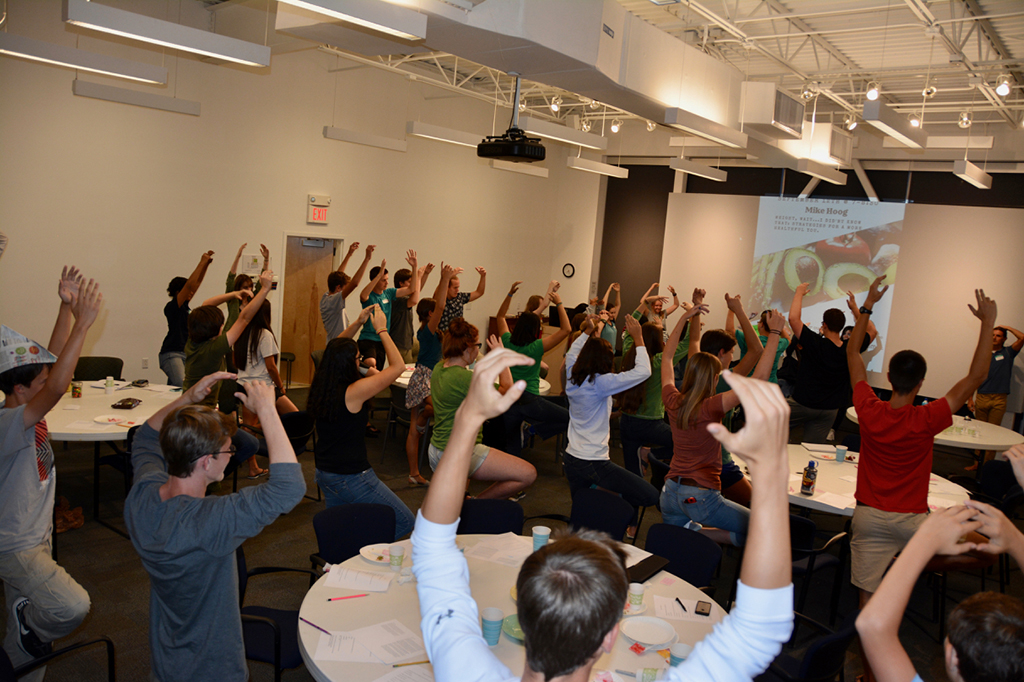
Teen leaders’ roles include marketing the program to their peers through social media, flyers, morning announcements, or during basketball game intermissions, all with the support of the teachers. They may also recruit their peers to perhaps join the teen leadership team using a recruitment video produced by a teen leader.
Sometimes collaboration with the schools takes an explicit form. For example, robotics is a popular topic both in school and out of school. Several of our member sites have invited the high school robotics team to lead a teen café to reinforce the powerful experience the robotics teens are learning in school, while sharing their knowledge and passion for robotics with peers. It has been a great recruiting mechanism for the school robotics clubs.
Most importantly, teen cafés bring to life the science teens learn in the classroom and illuminate the nature of science and nature of the work that scientists actually do. In a retrospective survey of former teen café participants, one of them stated, “Coming into it, my only experience of science before then was sitting down in a classroom…. But then my choice, my option to be there and checking out all this cool stuff that’s happening, it was just incredible for me. Being able to get my hands really on it rather than just the theory of it was a really big game changer for me.”
The evolution of the Teen Science Café Network
In 2006 we were inspired by the wild popularity of adult science café programs. Science cafés combine two essential components: They take place in a collegial social setting and they satisfy participants’ curiosity about a science-based topic through lively interaction with a scientist. This caused us to wonder: Could the science café model appeal to that hard-to-reach segment of the public, the high school teen? It is often the case that young kids will happily go with their parents to a museum or science center up until they are teenagers, at which point they become less than enthusiastic for that. As a result, their main, possibly only, exposure to science is what they get in school until they reach adulthood and have children of their own.
We decided to ask high school teens in four towns of diverse character in northern New Mexico about their interest. Using focus groups, we described what we had in mind for the program and asked the teens in each town what would make it fun and interesting, and would guarantee that they would participate. We asked three questions:
- “What do you find interesting about the concept and why would you participate?”
- “What topics are you most interested in and why?”
- “What obstacles would prevent your participation?”
What we learned
- Teens desire opportunities to develop and express independent thought: they also told us they want to learn about topics in the news, to hear other people’s opinions and perspectives (especially their peers’), to learn to separate fact from fiction, and to make up their own mind about an issue. A driving interest among the teens was the opportunity to participate in discussion and debate with peers and experts in a safe environment, i.e., where differences of opinion were respectfully shared without fear of reprisal.
- Teens desire mentors and friendships: Teens want to meet STEM experts to learn about current research. Teens also want help in finding mentors for school projects and science competitions. They liked the idea of social gatherings and electronic communications to collaborate on café projects with peers from other schools and towns.
- A wide range of topics stimulated rich café-type discussions: Teens were very interested in forensics as seen in television shows, future availability of oil and alternative energy sources, disease, and bioengineering issues. They also expressed interest in water use and availability, pollution, climate change, and forest fires. In all teen focus groups, hot topics resulted in short café-like discussions and demonstrated that teens’ interest and passion can drive informed and vibrant discussions.
- Our focus groups affirmed research (Pallant 1996; USNewswire 2006; Ballard, Dixon, and Harris 2016) that suggests teens have much interest and concern about their world, how science and technology are changing it, and how they can make a difference. Teens sometimes feel solutions to problems are out of their reach. While interested in learning more about challenging issues, teens in the focus groups expressed frustration about whether there was anything they could do to resolve the problems.
- Travel to meetings was seen as the only significant obstacle to participation. Our communities include rural and economically disadvantaged areas with no public transportation. Our solution was to support carpooling. Teens or their parents would bring a carload of friends to the meetings and receive a small stipend to cover the cost of gas. This significantly increased the number of teens attending cafés who otherwise would not have been able to come.
- Teens in our focus groups were enthusiastic enough about the project that the majority volunteered to be on one of the site-based Teen Leadership Teams (TLT) that guide the project development, provide leadership for implementation, and recruit their peers.
A nationwide effort
In 2007, with National Science Foundation (NSF) funding, we started an experimental program known as Café Scientifique New Mexico. The program proved to be popular and impactful with teens in the city of Albuquerque and in the small town of Española. The program was offered seven months of the school year in all four towns, and attendance ranged from 50 to 100 teens. Based on the persistent teen attendance and results of our evaluation of the Café Scientifique New Mexico over a three-year period, the NSF awarded the authors with a second grant to disseminate the model on a national scale in a program dubbed the Teen Science Café Network.
In 2012 the Teen Science Café Network was launched with eight sites around the country, and from there the network took off. The network has grown to 130 sites in 46 states, and we continue to welcome new members. Estimated cumulative attendance to 2018 is more than 115,000 teens.
Figure 1
Café site and attendance growth from 2012–2018
Any organization can become a member of the Teen Science Café Network and start its own teen science café program. Membership is free and we work closely with new members to ensure a successful start-up and continued operation. We conduct regular training webinars and Open Mic chats in which participants can ask questions about anything related to the teen science café. We have also populated the TSCN website with an extensive library of resources, a blog, “Cool Café” reports submitted by the member sites, and a monthly showcase of the activities of members.
Teen science cafés are free-choice and low cost. Unless salary is needed for the adult leader, the only cost involved is for cheap—but teen-friendly—food. Most sites provide colorful T-shirts for the teen leaders. A little money for carpooling is an option.
For teens participating in the program, we had the following goals:
- create an informal community that engages in scientific discourse, thought, and exploration;
- develop a deep and nuanced understanding of current issues in science and technology;
- communicate confidently and expertly with others about how current science issues affect daily life;
- develop skills and attitudes for lifelong learning; and
- gain an appreciation of STEM as a career and way of thinking.
What is a teen café event like?
Teen leaders have a role in each element of the event, with the overall purpose of creating a welcoming environment for learning. Teen leadership staff sit at a welcome table where they greet arrivals and register their contact information so they can be alerted to future events. Other leaders staff a food table with well-organized fare that appeals to teenagers, but is relatively inexpensive, like pizza or sub sandwiches. Other leaders chat with new arrivals or welcome and help the presenter get situated. One of the leaders will be the photographer or videographer for the evening. Another will lead an ice-breaker activity to get the teens out of their chairs and interacting with one another. A teen leader will introduce the presenter, who will then engage the teens in a spirited conversation around the subject of his or her professional interest. A teen leader will conduct a closing ceremony formally thanking the presenter. Then the teen leaders get to work cleaning up the venue. As few as four teen leaders have successfully fulfilled their roles, though teen leadership teams are normally larger than that.
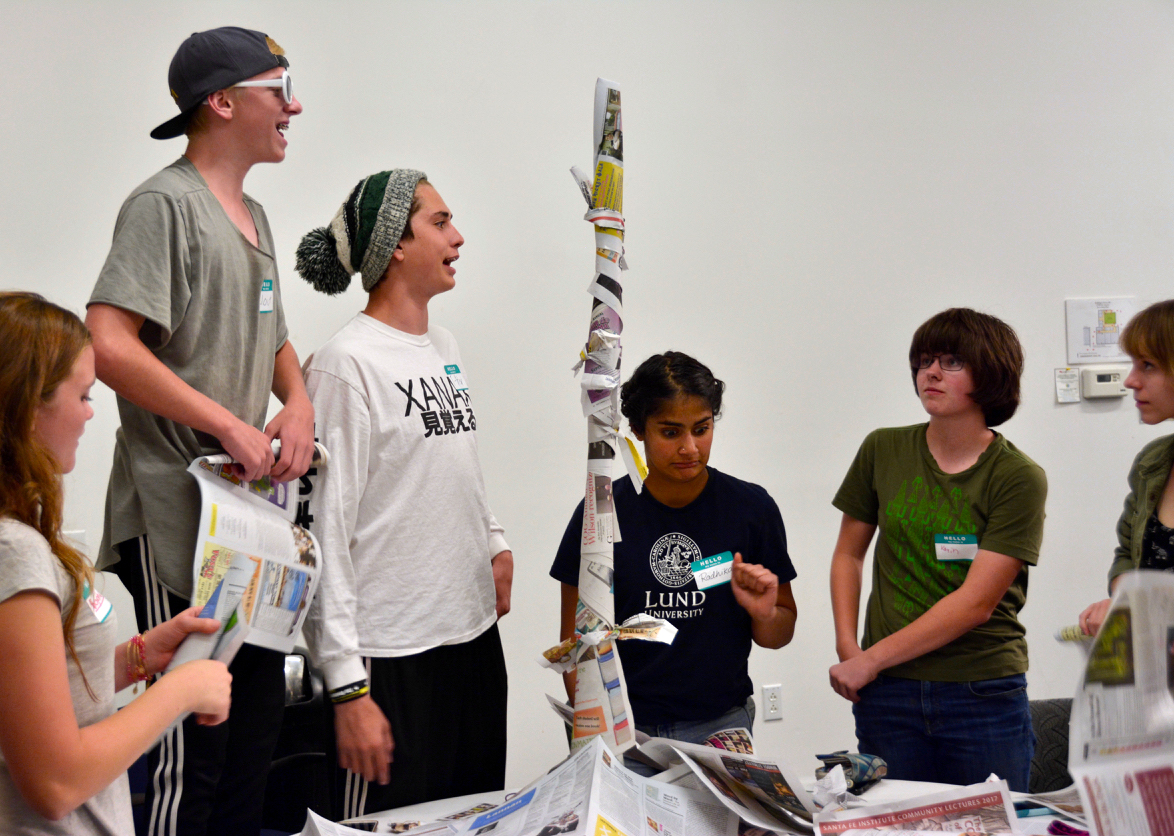
Most teen café events follow a common format. They are 60–90 minutes long and begin with refreshments and socializing over the meal. Then a teen leader will initiate an ice breaker that lasts 5 to 10 minutes. After that, the presenter is introduced and has a highly interactive conversation with the teens for anywhere from 20 to 40 minutes. Then there will be some kind of hands-on activity relevant to the presenter’s topic that further engages the presenter with the teens and the teens with each other.
Figure 2
Scenes from a Teen Science Café
Preparing the presenters
One thing that teens rarely get in school is hearing the varied stories of whom or what influenced someone to become a STEM professional; this is often a highlight of the café events. Presenters are encouraged to tell their personal story from their teenage years to where they are now. They usually tell a story about a highly non-linear path to their current position, with twists and turns along the way. Some presenters weren’t interested in pursuing science at all in high school. For instance, one neuroscientist initially set out to be a rock star! Another chose his college because of its reputation as a party school (but also thinking he might major in chemistry), and “One day, I was working away at my student-janitor job when an upperclassman in the hydrology department came up to me and said that a hydrology consulting firm in town needed some student help and there might be some field work involved.” With that, his path diverged. Such stories often get teens thinking that they could become a scientists as well.
Presenters are coached to use slides that are simple, colorful, jargon-free, and few. We also coach presenters to ask questions of the audience to judge their understanding of the topic. We seek conversation and exploration of ideas among teens and the presenter. Some cafés divert from the standard format, by holding the café in the presenter’s lab or visiting a major STEM employer.
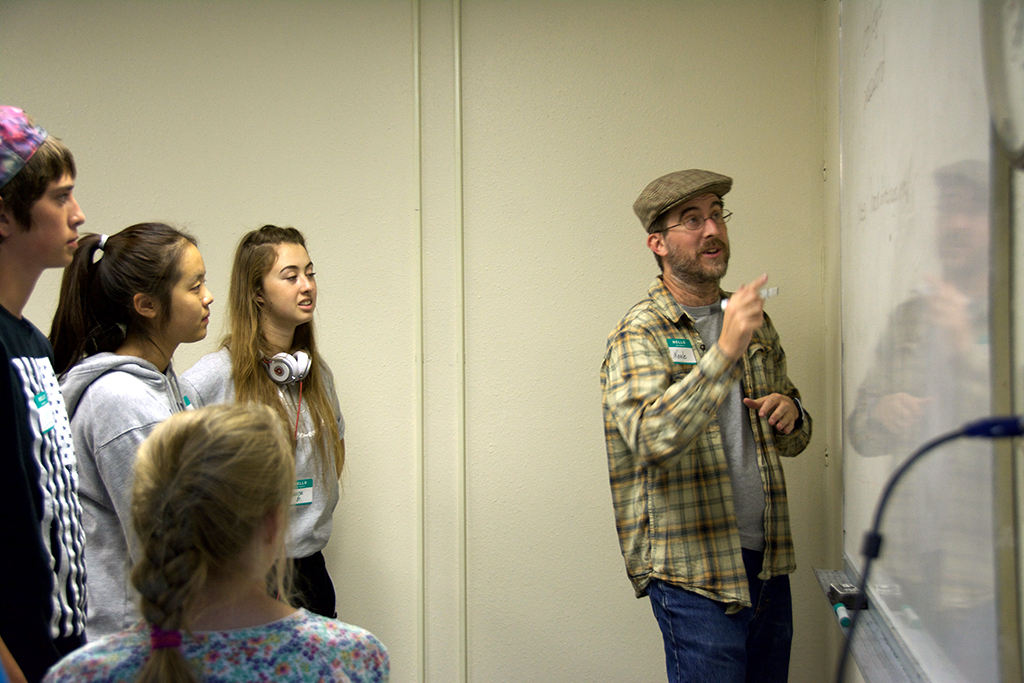
What is the essence of a teen science café program?
What we learned from our experiment in New Mexico was that there are six core design principles underlying the success of the teen science café model. Our member organizations agree to conduct teen science cafés in their communities that are aligned with the following principles.
- Café programs are highly engaging and interactive. They are structured to promote lively conversation and interaction among teens and the presenter; a café is not a lecture.
- Scientists are carefully vetted and guided in communicating with teens. Presenters focus on storytelling, the big ideas, why it matters, and how it will change our world—supported by a few jargon-free graphics.
- Teens gain a sense of ownership of their program through opportunities for leadership. Teen leadership teams are responsible for all aspects of their program, with adult leaders providing support in the background.
- Each café site has an adult leader who is committed to the program and the teens. The adult leaders have the energy and dedication to organize and support the work of teen leaders.
- Café programs seek to attract teens with diverse motivations and life experiences. Diversity includes ethnicity, culture, and gender, but also motivations to learning about science. Teen cafés are not just for the science geeks; they are for all curious teens.
- Café organizers actively cultivate strong community relationships. Building relationships with scientific and teen-serving organizations can increase participation of both teens and scientists, support community awareness, and sustain your café program.
Exploring the full range of science and technology
Most programs in the network offer teen cafés on the whole range of science and technology. The following titles are a few of the topics covered in the café sessions.
- Ethical Hacking and Codebreaking
- Are We Alone? The high-tech search for signs of life on Mars
- Search and Rescue Dogs Go High-Tech in DownEast Maine
- Tectonic Mysteries: A billion-year “who done it”
- Genes in the Kitchen: GMOs and the quest for sustainable agriculture
- Matter vs. Antimatter: Why are we here?
- Stopping Criminals and Climate Change With … Chemistry!
- From Biggest Bangs to Black Holes: A look at the brightest explosions in the universe
- Algae Biofuel: Is pond scum the next oil boom?
- The Brain of the Zombie: Can neuroscience explain gruesome zombie behavior?
- The Science and Engineering of Space Exploration
- Nature’s Spectacular Light Show: Mapping auroras with Twitter
Readers may wish to get a broader view by viewing 11 years’ worth of titles, highly personalized bios and essays, written by presenters in the New Mexico program.
While most sites offer programs over the full range of science and technology, some have a particular thematic focus. A cluster of aquaria and marine research centers focuses on ocean science. A site in Kentucky teaches health science. A recent theme has been introduced to the Network titled “Applications of Technology in Emergency Response to Natural Disasters,” and a significant number of sites have introduced this theme in their programming, bringing in first responders as presenters.
Cafés take place in a variety of venues and organizations
The simplicity of the teen café model means that it can be adopted within a wide variety of geographies, from small towns in rural settings of North Carolina, Kentucky, and South Dakota to the inner cities of New York, Philadelphia, and San Diego, provided there is a committed adult leader and a safe venue that encourages conversation. The network continues to grow via partnerships with organizations large and small to provide access to teen science cafés. Typically, sites host seven cafés per academic year and attendance ranges from 25 to 100-plus.
Roughly a third of the sites in the network are located in rural areas. For these sites, the principal issues appear along two dimensions of isolation, one being the obvious one of communities spread thinly over a large area, the other being the isolation adult leaders may experience because of the lack of a local STEM ecosystem that can provide support. The network is launching a research program to understand the challenges of the rural sites and seek solutions to those challenges.
Science is everywhere!
Adult leaders just starting a teen café program commonly look initially to local colleges and universities for presenters. This becomes problematic for rural sites if there aren’t any nearby. The network helps the sites recognize that all kinds of professions have a STEM basis. This includes plumbers, linemen, electricians, engineers, architects, bankers, engineers, architects, radio and cable technicians, water managers, foresters, and first responders. Every county in the country has these professionals. Moreover, it is important that teens recognize that science careers can be built on various levels of education. For example, a café held at an fMRI facility in Boulder, Colorado, featured a joint presentation by a PhD scientist and an MRI technician with a two-year degree.
Evaluating teens and presenters
Impact on the teens
Our evaluations document that in addition to achieving increased STEM literacy, teens have gained a more realistic picture of scientists as real people leading interesting lives. Teens better understand the nature of science, see the real-world application of the science they learn in school, and are more likely to see the relevance of science to their lives.
Our summative evaluation “analyses indicate that the café program succeeded at positively influencing attitudes about science. All the items designed to measure attitudes toward science, scientists, and science-based careers showed statistically significant differences between the participant and non-participant groups.”
A study of long-term impacts of the program on teen participants based on surveys and focus groups were carried out (Sickler 2018a). “This study took advantage of the 10-year history of “CafeNM,” and sought to answer the question: What are the long-term influences of participation on alumni’s academic, professional, and personal trajectories? The study used a retrospective approach to tap into the memories and life experiences of alumni. Phase 1 was a survey of alumni known to have participated regularly between 2008 and 2010 (n = 57). Phase 2 included follow-up interviews and focus groups with alumni with a range of experiences.
“The principal conclusions are: (1) The vast majority of alums recall CafeNM as a very good experience: fun, social, and an opportunity to learn about interesting topics and to meet working scientists. (2) The vast majority of CafeNM alumni majored in STEM subjects at the undergraduate or graduate level, and around half of those who hold jobs are in STEM fields. (3) CafeNM made science tangible, personal, and ‘very’ or ‘extremely’ influential on their understanding what scientists do and awareness of science careers. (4) CafeNM seemed to have stronger influence on those who were not involved in other STEM activities than those who were.” (Sickler 2018a)
One teen expressed the typical appeal of the welcoming social setting, combined with the interaction with the scientist on an interesting topic: “For me it was the topics and the format and how it was very intimate, and everybody could kind of ask questions and have conversation. That was really nice.”
Other teens shared the following comments:
- “Getting a glimpse at a variety of different speakers’ interests and all the amazing things that are out there in this world to be explored or worked on. New information is invaluable, and exposure to something—even if the field is only a minor interest for me as an individual—is still one of my favorite things.”
- “… really care about understanding the basics of science or staying literate or being able to read the news and know what they’re talking about, or [that] being able to research things on my own are important, feasible, doable things.”
As a result of participation in a teen café program, some teens discovered the possibility of a life in science that had not occurred to them before. One participant in a retrospective survey stated that “Cafe Scientifique definitely influenced my decision to pursue research opportunities in college, first working as a lab assistant and then conducting my own research for my thesis.”
Another said, “For me the casual atmosphere with a scientific professional, with someone who was an expert in their field made the science and the idea of actually becoming a scientist far more tangible for me. I didn’t know a lot before [Café Sci], and now I’m in grad school for chemistry and that definitely made it seem tangible…I think that definitely affected my career path.”
Impact on presenters
Recent surveys (Sickler 2018b) of presenters’ motivations and attitudes with regard to their participation reached a conclusion that,
"Scientists are [primarily] motivated by a mix of two factors: their desire to contribute to the collective good (impacting the teen audience) and intrinsic personal enjoyment. While the collective motivation is paramount [in outreach] for both [adult and teen] audiences, it is significantly stronger for working with teens. A motivating attribute of Teen Science Cafés, in particular, is the opportunity to engage with and possibly impact an audience that is at an influential life-stage.”
Scientists also report strong satisfaction with gains in the quality of their science communication. A significant number have reported that their experience with the program has led them to think in a new way about the relevance of their own research and how best to communicate it (Mayhew and Hall 2016). The following feedback is typical:
"The Café experience was beneficial to me as a scientist in that preparing an interactive talk for an audience of young people helped me identify the critical issues in my work: why I was doing it, why it is challenging, what we are trying to accomplish (vs. being bogged down in technical details). This really focused my thoughts about my work.”
The teens themselves appreciate a presenter who fully engages them in a conversation. One teen said,
"I think one of the key things is having those great scientists who are going to come in and really be engaged because it’s very easy to just sit up there and do your lecture that you always do…. having access to the scientists who are really hands-on, really engaged, really want to reach out to the community [is critical].”
Interested in starting a teen café in your community?
The long-term goal of the Teen Science Café Network is a massive number of teens who enter adulthood as citizens with a sophisticated understanding of the science process, a significant number of whom will follow myriad pathways into the U.S. STEM workforce.
Organizations interested in starting a teen science café program can start by perusing the website, looking especially at the Getting Started section and the blog, Cool Cafés, and Spotlight sections. They may then contact the TSCN National Resource Center. A call will be arranged to talk over how a teen science café program might fit with the host organization and answer any initial questions. The National Resource Center will then be available to provide help as needed.
Michelle Hall (hall@scieds.com) is president of Science Education Solutions in Los Alamos, New Mexico. Michael Mayhew (m2mayhew@gmail.com) is senior research scientist at Science Education Solutions in Los Alamos, New Mexico.



